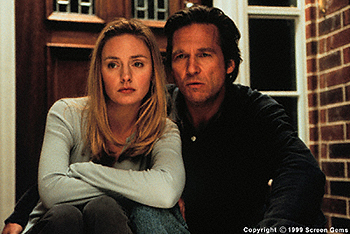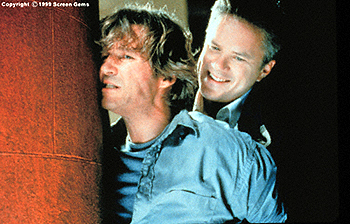Arlington Road


Poor Arlington Road. Originally, the makers of this film wanted to throw it onto unsuspecting Amerian audiences, letting them discover for themselves the twists and turns in the plot. But then the summer box office race began, and the release date got pushed back . Back so far that the movie came out in Europe before it did in America. Even worse, Sony Pictures Entertainment released a preview that gave away many of the secrets awaiting in the film. Because of this, the entire effect of the movie is duller.
Jeff Bridges is Michael Faraday, a history professor at George Washington University. He just happens to teach a course on domestic terrorism. Just a while ago, his wife was killed in a (purposely) Ruby Ridge like incident. Now, he lives with his son (Spencer Treat Clark) and his girlfriend Brooke (Hope Davis from Next Stop Wonderland). One of the first secrets given away is that at the beginning, Faraday rescues a young boy. It turns out to be the son of his neighbor, Oliver and Cheryl Lang (creepily played by Tim Robbins and Joan Cusack). The Faradays and the Langs then start to get to know each other better, becoming friends along the way. But Faraday begins to notice strange things that don't seem quite right. Little things seem out of place, giving Faraday a reason to wonder. As he begins to uncover more and more, he becomes more paranoid and seems to think that the Langs are some kind of terrorists (I'm not giving anything away, because this is extremely apparent in all of the commercials).Arlington Road is a movie about truth and paranoia. Just how well do we know the people who live right across the street? How much can we actually trust the government? How far will you go to protect your family? Throughout the movie, you are supposed to be as much in the dark as Faraday on whether or not the Langs are actually terrorists or not (ahem, see upper right picture). Is he really onto something, or is he distraught over the death of his wife and looking to place blame? Is all of his worrying just a product of an overactive imagination after teaching terrorism too long? The movie starts off as a good suspense thriller, but things start to deteriorate after the first third. One mark of a good movie is that no matter how improbable the plot, you believe that there is some possiblity that it may happen. Here, Ehren Kruger's script pushes the boundary, breaks it, then keeps going. Each subsequent even is more improbable than the one before, making the entire end of the movie unintentionally funny instead of riveting.